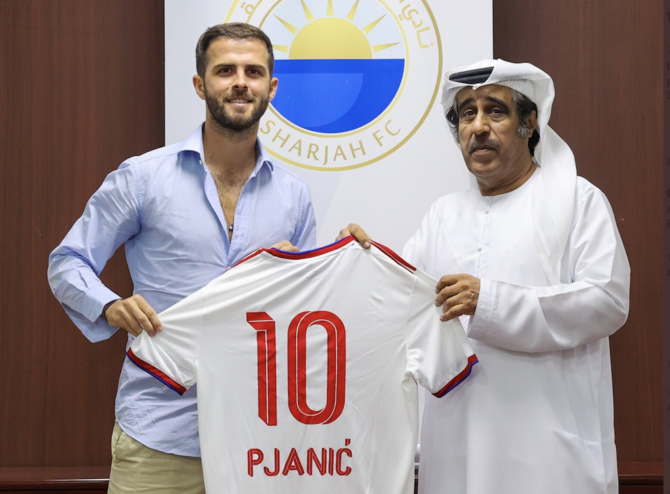SHARJAH, United Arab Emirates: Another day, another eye-catching ADNOC Pro League addition.
It is not hyperbole, however, to describe Miralem Pjanic’s decision to swap Barcelona for Sharjah as the division’s boldest move in a decade.
The cultured Bosnia and Herzegovina midfielder’s switch — on a lucrative two-year contract, with a one-year option to extend — is a statement of intent designed to reverberate far beyond the UAE’s borders.
Fabio Cannavaro, Luca Toni and David Trezeguet were the last imports of similar prestige to the four-time Serie A winner.
This move is a tier above that of fellow Sharjah recruit Paco Alcacer and champions Al-Ain’s standout pre-season addition, Andriy Yarmolenko.
Such is its profile, that football transfer doyen Fabrizio Romano chronicled Pjanic’s journey to feverish reaction on social media. Regulation ADNOC Pro League rumors do not usually register on the unremitting Italian’s radar.
Domestic opponents Al-Ain and Al-Jazira have been put on notice that being a runner-up is not enough for The King. So, too, have Saudi Arabia and Qatar’s finest if they make it into the reformatted 2023-24 AFC Champions League.
This is the kind of limitless ambition required to justify last November’s lavish hire of relentless title winner Cosmin Olaroiu to manage Sharjah. The administration has truly produced a premium replacement for Otabek Shukorov.
It would be naive to paint the entire picture as positive.
Pjanic, who was bombed out of Barcelona a year ago by unimpressed head coach Ronald Koeman, has been an unused substitute in all four La Liga games this term and last registered a league goal in October 2019.
The subsequent struggles in the UAE of the aforementioned World Cup winning trio also point to potential pitfalls which await both club and their 32-year-old veteran signing.
But there is ample reason to believe this scenario could play out differently.
Pjanic landed in the emirate in midweek with a ringing endorsement freshly provided by Camp Nou supremo Xavi, someone uniquely positioned to comment on midfield acumen and not inclined to deliver hollow praise.
“Pjanic has decided to leave for more opportunities,” the Catalan icon commented. “He has been a great professional, so I think he had chances here.
“But everyone chooses their own path.”
This is a distinctively different setting to Lyon, Roma or Juventus. Also to Besiktas in 2021-22, where Pjanic registered four assists in 26 matches and won the Turkish Super Cup lifted while on loan.
In Istanbul, Pjanic was used during his time at the Vodafone Park as a deep-lying playmaker in a 4-2-3-1 formation, traditionally favored by future boss Olaroiu.
At Sharjah Stadium, he can expect to either sit alongside all-action UAE international — and fellow new signing — Majed Hassan. He could also be pushed into an attacking midfield role behind Spanish poacher Alcacer, with either the sprightly Majed Surour or Majid Rashid providing added energy at the base with Hassan.
This duo are not the only youngsters set to be inspired by Pjanic’s presence.
Guinean prospect Ousmane Camara began the campaign with both assists in the agenda-setting 2-0 victory at Shabab Al-Ahli Dubai Club. Witnessing Pjanic’s lofty standards at close range can only lift the 21-year-old further, and faster.
Regular hamstring complaints in Turkey must be astutely managed by Sharjah’s medical staff to get the best out of Pjanic. The club will also have to delicately deal with the weight of expectation understandably generated by an arrangement of such standing.
The Bosnian also operates in a part of the pitch rarely appreciated by squads constrained by foreign quotas.
It is difficult to quantify the contribution of someone who does not weigh in with goals up front, tee up plentiful assists out wide or deliver crunching tackles and clean sheets from central defense.
Portugal’s Hugo Viana rarely received the copious praise his consistently elite displays deserved while at the subsumed Al-Ahli and Al-Wasl.
This situation has been exacerbated by the fact Emirati academies are able to regularly produce center midfielders capable of excelling in Asian football. But this season’s move to five open-age, non-Emirati slots alleviates the problem of perception.
Where Pjanic can take responsibility, however, is in his own output.
Big names have logged mixed performances in the UAE’s professional era.
Cannavaro, Toni and Trezeguet were all signed at an older age than the Bosnian. They contributed a combined 33 forgettable UAE Pro League appearances, at a level far below their gargantuan reputations.
Former France, Paris Saint-Germain and Newcastle United battler Yohan Cabaye was deregistered by Al-Nasr midway through a mediocre 2018-19 season. Ryan Babel faced demotion to Al-Ain’s reserves in 2015 and Lassana Diarra lasted mere months at Jazira in 2017.
Yet Ghana superstar Asamoah Gyan plundered 95 goals in 83 top-flight appearances for Al-Ain from 2011-15. Brazil forward Grafite delivered on his rarefied status at Ahli in the same period, Alvaro Negredo left Nasr as a beloved ADIB Cup-winning legend and Thulani Serero frequently showcases Ajax-honed skills in midfield at Jazira.
The 2022-23 season has been preceded by tales of further Al-Ain domination after they retained inspirational head coach Serhiy Rebrov, attracted fellow Ukraine icon Yarmolenko and purchased Golden Boy nominee Matias Palacios.
Chasers Sharjah moved at slower pace in the transfer window.
Now their patience has been rewarded with spectacular free transfers for Alcacer and Pjanic which threaten to tip the balance in this campaign’s hotly anticipated title race.
Ominously, they remain the only challenger with a final foreign spot to fill ahead of the Oct. 4 deadline. Links to Corinthians forward Roger Guedes have been widely reported this week in Brazilian media.
Sharjah stunned Middle East football in 2018-19 when they rebounded from years of relegation worries and stormed to an unexpected Pro League-success.
There are no surprises this time. Sharjah, with Pjanic in the ranks, mean business.


























